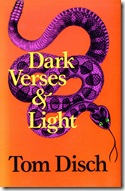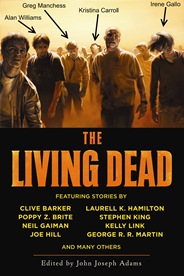As I mentioned in my previous post, in college I wrote an essay about Tom Disch’s poetry collection, Dark Verses & Light. Here it is:
***
 Thomas Disch’s Dark Verses & Light is a diverse assortment of poetry, including traditional verse, a verse play, and the poems of a fictional poet. Disch includes everything from a verse play with a talking corpse exploring the properties of particle physics to a deceptively simple poem pondering which tie to wear. Reading this collection is an emotional roller coaster, and the poet’s voice ranges from innocence to cynicism.
Thomas Disch’s Dark Verses & Light is a diverse assortment of poetry, including traditional verse, a verse play, and the poems of a fictional poet. Disch includes everything from a verse play with a talking corpse exploring the properties of particle physics to a deceptively simple poem pondering which tie to wear. Reading this collection is an emotional roller coaster, and the poet’s voice ranges from innocence to cynicism.
Section one contains only one poem, “The Snake in the Manger: A Christmas Legend” and the verse play “The Eightfold Way: A Masque in Five Tableaux.” In this section, you will find experiments in meter and rhyme, and the occasional turn of phrase so clever it makes the poem worth reading all by itself. In “The Eightfold Way” a man reincarnated as a woman dances with his former male self and explores the nature of DNA:
Thymine, my other self! Mythical twin,
Twining with me in serpentine helices,
Mirror reversing right and left,
Machine of perpetual emotion,
Loom on which the shuttles of my soul
Flash to and fro, genetic spinning jenny,
Sin with me, spin with me
Deoxyribonucleically.
Another example of Disch’s playful use of language can be seen in the following excerpt from the same verse play:
What care I where I am
While I am with you? Were you of uracil,
Still would I love you, still would my oxygen
Lock to your phosphorus. Across the Aegean
And up through the Bosporus, my galley should sail,
Like a new Cleopatra’s.
In this startlingly bizarre verse play, you will also find a corpse and a mechanical mouse conversing, talking electrons, and an impression of Robin Leach doing “Death-styles of the Rich and Famous.” The play ends and finishes its explanation of physics with a game of cosmic “three-shell monte.”
Section two begins with a powerful short poem, “Back Here,” which tells us that one can never go home. However, perhaps the strongest piece of this section, “Why This Tie, Why That,” portrays both the innocence and cynicism of Disch’s poetry. This is a poem exploring the reasons for wearing a tie. The poem hits hard by lulling the reader with the mundaneness of the subject matter (“Because it was foremost on the rack”). Then we’re slapped with emotion by a line like “Because I’m blue.” The reader is then left with a mixed feeling of hope and sadness when the poem ends with the last and perhaps most telling reason of all:
Because this is exactly who I am,
could be, might wish to be,
today, this afternoon, or some day soon.
Perhaps the most interesting portion of this collection is brought to us in section three, by the fictional former filmmaker and world’s worst beat poet, Joycelin Shrager. Disch gives us a detailed short history of Joycelin’s life, then leaves us to wander through her poetry, which ranges from the humorous (“i am just a plain poet”) to the obsessive (“when i am sick science fiction”). Included in all “Shrager’s” poems are her idiosyncrasies, including but not limited to her total lack of capitalization and punctuation, her constant misspelling of poem as pome, her overuse of ampersands, and her refusal to title her poems. “Shrager’s” unusual personality comes through in each “pome,” but perhaps most clearly in “if you know what i mean,” which is dedicated “to john ashbery with love from joycelin.” This poem in a way responds to a line from “i am just a plain poet” in which “Shrager” quips:
you can’t expect them to like
a subtle poet like john ashbery
(who i have to confess doesn’t make
a scrap of sense to me)
In “if you know what i mean,” “Shrager” explains how her teacher “andy lowe explained” ashbery’s poems and ordered his class “go thou & do likewise.” The rest of the poem then goes on to explain to the reader how “Shrager” cannot understand the method of Ashbery’s madness.
Section four opens with a return to Disch’s own poetry, and a disconcerting one at that. “Selected Quirks” explores “whether the moral status of mankind has undergone an improvement in our times.” It does so by citing twelve cases of aberrant behavior. “Case One had masturbated all his life…. / Case Ten had incest twice with Case Eleven.” Disch then ends on a somber and disturbing note, “But worse than these was Twelve, who would not choose.” Disch’s cynicism is most readily apparent in his “Poem from the Pen.” This is a poem about a normal everyday man who
could have been a boxing pro
but drugs & liquor laid [him] low.
He “killed a man” and now he’s in prison “For forty years.” The poem ends with one of Disch’s best stanzas, which contains both a clever turn of phrase and seamless rhymes:
They say you shouldn’t bear a grudge
But if I could I’d kill my judge
And hang the jury who hung me
Oh how I long for liberty
Overall, this collection will make the reader smile, frown, and shake his head in consternation. It is a complex lot, not easily categorized or referenced. Critic Thomas Fleming has characterized Disch’s poetry as “quirky, unpredictable, and irreverent with a satire that is savage in its restraint.” That is a beginning to classifying Disch’s work, but Disch himself would likely resist these and all other labels. In any case, Dark Verses & Light is too diverse a collection to pass up, whether it can be fit neatly into a category or not.
Read More




